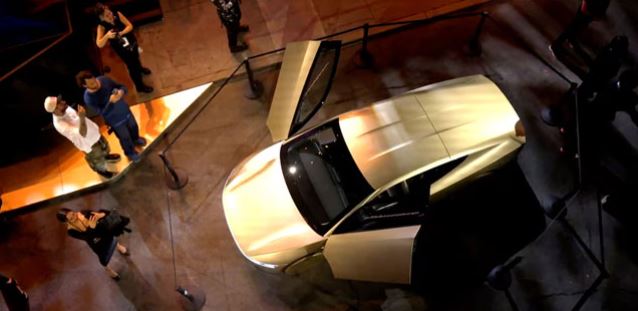

Elon Musk showcased a robotaxi with two gull-wing doors and no steering wheel or pedals at a splashy event on Thursday and added a robovan to the roster as Tesla’s goal shifts from low-priced mass-market automaker to robotics manufacturer.
Musk reached the stage in a “Cybercab†which he said will go into production in 2026 and be priced less than $30,000. He said operation will cost 20 cents a mile over time and charging will be inductive, requiring no plugs.
He said the cars rely on artificial intelligence and cameras and do not need other hardware such as what robotaxi rivals use – an approach investors and analysts have flagged as challenging both from a technical and regulatory stand point.
“The autonomous future is here,†Musk said. “We have 50 fully autonomous cars here tonight. You’ll see model Ys and the Cybercab. All driverless.â€
Musk also showcased a larger, self-driving vehicle – called Robovan – capable of carrying up to 20 people, and showed off Tesla’s Optimus humanoid robot.
Musk’s plan is to operate a fleet of self-driving Tesla taxis that passengers can hail through an app. Individual Tesla owners will also be able to make money on the app by listing their vehicles as robotaxis.
Thursday’s event at the Warner Bros studio near Los Angeles, California, is titled “We, Robot†– an apparent nod to the “I, Robot†science-fiction short stories by American writer Isaac Asimov, but also echoes Musk’s insistence that Tesla “should be thought of as an AI robotics company†rather than an automaker.
Those attending included investors, stock analysts and Tesla fans.
Investors expecting concrete details on how quickly Tesla can ramp up robotaxi production, secure regulatory approval and implement a strong business plan to leapfrog rivals such as Alphabet’s Waymo were left disappointed.
“Everything looks cool, but not much in terms of time lines, I’m a shareholder and pretty disappointed. I think the market wanted more definitive time lines,†said Dennis Dick, equity trader at Triple D Trading. “I don’t think he said much about anything… He didn’t give much info.â€
Musk said he tends to be optimistic with time frames.
MISSED PROMISES
Musk said in 2019 he was “very confident†the company would have operational robotaxis by the next year. After missed promises, Musk this year diverted his focus to developing the vehicles after scrapping plans to build a smaller, cheaper car widely seen as essential to countering slowing EV demand.
Tesla is at risk of posting its first-ever decline in deliveries this year as buying incentives have failed to attract enough customers to its aging EV lineup. Steep price cuts meant to offset high interest rates have also squeezed profit margins.
Complicated technology and tight regulation have led to billion of dollars in loss for other companies attempting to crack the robotaxi market, forcing some to shut shop.
Some are still pushing, including General Motors’ Cruise, Amazon’s Zoox and Chinese firms such as WeRide.
Unlike expensive hardware such as lidar that others use, Musk is relying only on cameras and AI to run FSD to keep costs down. But FSD, which requires constant driver attention, has faced regulatory and legal scrutiny with at least two fatal accidents involving the technology.
“We do expect to start fully autonomous unsupervised FSD in Texas and California next year. Musk said. “That’s with the Model 3 and Model Y.â€
He did not say if the robotaxis will use any new technology or depend on FSD.
Source: Reuters
–Agencies
The Sri Lankan government has decided to declare April 26, 2025 (Sunday), a National Day…
The public are urged to avoid coming to venerate the Sacred Tooth Relic in Kandy…
Colombo Additional Magistrate Harshana Kakunawela today issued an order preventing two suspects, a father and…
The Archbishop of Colombo, His Eminence Cardinal Malcolm Ranjith, departed for the Vatican this morning…
Three suspects have been arrested in connection with the murder of the convenor of the…
The special exposition of the Sacred Tooth Relic, ‘Siri Dalada Wandanawa’, commenced today for the…